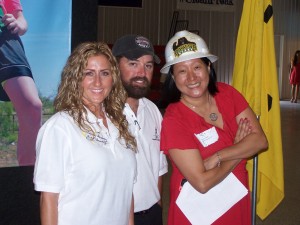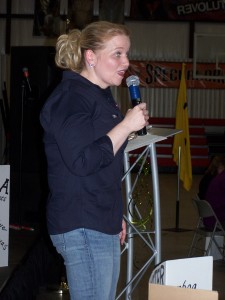A new social media channel hopes to turn black gold a new shade of pink.
By Paul Wiseman, Special contributor
“Just the good old boys / Never meanin’ no harm.”
For most of its history the oil and gas industry’s mode d’emploi could’ve started with the opening lines from that Dukes of Hazzard theme song. In 2015, as a matter of fact, women still make up only about 19 percent of the work force, according to a study quoted on the American Petroleum Institute website. That study found that the largest barrier to women seeking employment in the industry is a lack of knowledge about the opportunities available.
Katie Mehnert is attacking that disparity and lack of knowledge with missionary zeal. Starting with an idea scribbled on an airline cocktail napkin during a flight from London to Houston, Mehnert’s Pink Petro social media channel, launched in March of this year, is quickly gaining steam on a worldwide level. Just three months after its March launch date, Pink Petro boasted 500 members (women and men) in 18 countries representing 120 different companies.
In mid-June Mehnert shared her vision with an enthusiastic audience of about 100—mostly women—at Midland’s Teen F.L.O.W building. “The whole goal of Pink Petro is not just to unite and connect women—and socialize,” she stated, “it’s also to develop roots, it’s also to develop resources, help us get access to the information we need quickly.”
Unlike most other social media sites like Facebook, Twitter, LinkedIn, and others, membership in Mehnert’s site is subscription-based. Costs range from $50 per year for the unemployed up to $500 per year for top-tier professionals. This, said Mehnert, assures that all members are serious about the goals of Pink Petro and are not there to sell something, to spam other members, or to do anything else deemed inappropriate. It means the site is “No noise, all quality.” It also allows Pink Petro staff to be full-time and fully devoted to expanding the site’s scope and purpose.
On the plane flight from London (she was working for BP at the time), Mehnert sat next to a gentleman whom she refers to as PaPa, who asked her why she wasn’t home with her 4-year-old daughter instead of working in the oilfield with all its dangers. A long overseas flight with only some wine, cocktail napkins, and a pen gave her time to think about and respond to what the man had said. “I started to think, ‘We could take social media… and use it to disrupt the gender gap.’ What I mean by that is, it shouldn’t take 30 years for my four-year-old daughter to achieve any sort of parity.”
She viewed social media as a chance for women in the industry to connect, learn, share resources, and help each other. Mehnert shared a particular example.
“Two weeks ago a woman who lost her job at BP in Houston announced to us that she got a job through Pink Petro,” through people the woman had met through the channel. “That’s why it exists. It exists to connect you to people you need to know and people that need to know you.”
It is also a place to ask questions and to connect with people from all walks of life. This idea strongly connected with at least two attendees. Jennifer Rice, an upstream unconventional engineer with ConocoPhillips, and Sydnee Fowler, Sales Director of Drifting and Casing Inspection for Forza Safety, met face-to-face for the first time at the gathering. They had become Facebook friends about a year earlier.
Rice said one appealing aspect of Pink Petro was the opportunity to ask questions, particularly about how to deal with men in the field. Fowler added, “There you can ask questions like how to dress for a job interview so that you look professional, but the interviewer doesn’t think you’re afraid to get your hands dirty.”
Fowler related that one interviewer seemed very interested in hiring her throughout the entire process, until he asked one final question. Having ascertained that she was single, he then asked if she had any children. As a single mom, she answered yes, and did not get the job. Besides the fact that the question is illegal, she noted, “They would never have asked that question of a man.”
Rice added that she felt this sort of thing could be safely discussed on Pink Petro. Both said that, while they were not yet members, they were strongly considering signing up due to these considerations and the fact that there were few other opportunities for women to network.
Jana Bewley came from Halliburton’s Dallas office to attend the meeting. Halliburton is a corporate sponsor of Pink Petro, allowing its employees the time off needed to attend. Bewley noted that Halliburton employs thousands of people, and a social platform like Pink Petro would allow her to “put a face with a name. I think this is a great idea.”
Mehnert herself, reared in the oil fields of Louisiana, got into the oil and gas business after two significant events: her father, an oilfield engineer, warned her not to, telling her to become either a lawyer or a fisherman; and a meeting with a woman who was an engineer for Shell, who encouraged Mehnert to go into oil and gas anyway.
She has worked safety for both Shell and BP, signing on with the latter right after the Macondo/Deep Water Horizon spill in 2010. According to her website, her current venture is called Cognovi, which offers strategic change management solutions.
As for goals, Mehnert said LinkedIn has around 300,000 women member who are in the oil and gas sector. “If we can get the best 10 percent of them, that would be 30,000” for Pink Petro. Throughout her talk at Teen F.L.O.W. she had stressed quantity over quality. With those numbers, she hopes to “help companies understand where we [women in the industry] stand.
She also pointed to the fact that, due to the long oil bust of the ’80s and ’90s, when few people entered the business, there is about to be a huge talent shortage when the current generation retires over the next few years. “That’s a huge amount of experience that can’t easily be replaced,” she noted. To fill these gaps, the industry must widen its recruitment to include women as well as men.
“Guys are already good at networking—they’re always ready to help each other out,” she continued. She hopes Pink Petro will help women do the same.
“We can’t take another 30 years to get parity,” she repeated, citing the fact that her young daughter is saying she wants to grow up to be a “Ninjaneer.” At that point Mehnert acknowledged that there are already efforts to bring women into engineering in particular, and that “We need to give them a whole host of options, not just engineering. We need to show them all the potential paths.”
Women can also help spread a more positive view of the industry to the general population. Noting that “everyone knows about Deepwater Horizon” but not everyone realizes how much the world depends on oil for things other than fuel—plastics in cell phones, computers, and other devices—women in the industry can help spread the positives as well.
Rally organizer Kim Smith, a landman whose company is named Development Resources, feels the meeting helped women realize that they can be a force in the oil and gas business. “I believe attendees left knowing that women are significant in the industry as decision makers, whether they’re with drillers or service industries like R&D Pipe,” she said.

Pink Petro event organizer Kim Smith, right, relied on help from many individuals to feed approximately 100 attendees. Two of those were Zac and Angela Hernandez of Z & A Consulting & Services, Inc.
As for Pink Petro itself, Smith said that the media site does not have an approval process for membership, “giving you permission to have a voice in oil and gas. Many people, male and female, find it refreshing.”
Smith gave credit to Permian Basin Landmen’s Association President Danny Kidwell, among others, for getting the word out. She added that future Pink Petro-related events are planned, which will be listed for members on the Pink Petro website.
Smith’s Development Resources hosted the event, along with Midland Memorial Hospital and Teen F.L.O.W Ministries. Appropriately, the luncheon included pink pancakes and slices of pink cake. The cooking was overseen by Zac and Angela Hernandez of Z&A Consulting & Services, Inc. The Hernandezes became involved because they knew Smith’s husband, Byron, who works with her in Development Resources.
With Mehnert’s interest in safety procedures, it is not a surprise that she is driven to make the oifield a safe place for women. Perhaps when the gender gap is more disrupted and the PaPas of the world have changed their views, Mehnert can finally take her father’s advice and become a fisherman. She’s already working hard to land a big catch for women in the oilfield.
Paul Wiseman is a freelance writer in Midland. His email address is fittoprint@sbcglobal.net.











